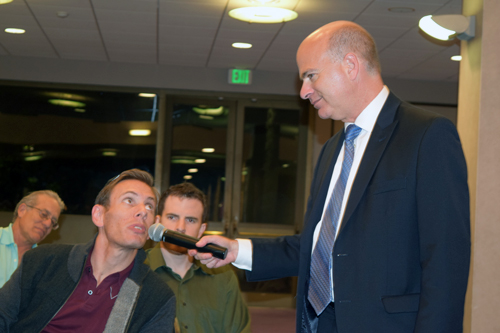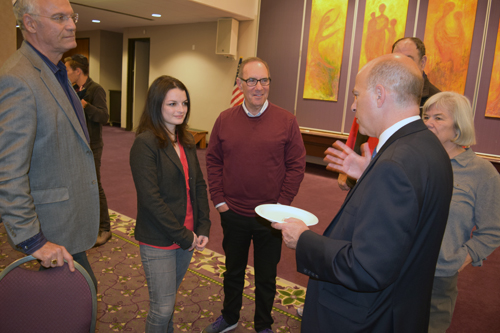
By Donald H. Harrison

SAN DIEGO – Back in the days when J. Edgar Hoover was the fabled director of the FBI, there were basically two types of applicants the national law enforcement agency considered qualified to become special agents: attorneys and accountants.
That’s not the case anymore, Eric Birnbaum, the special agent in charge of the FBI’s San Diego field office, told a forum hosted by the Men’s Club of Tifereth Israel Synagogue on Thursday evening, Nov. 12.
Today the 36,000-person FBI seeks recruits of many different backgrounds and interests to fill such job classifications as special agents, intelligence analysts, linguists, staff operations specialists, auto mechanics, and executive assistants.
However, added Birnbaum, “I will admit these days we are very interested in individuals with a cyber background to come in – that’s a priority because it is one of the director’s (James Comey’s) themes and the Internet is involved in everything…. So having computer scientists who know all about that stuff is important.”
The Internet, noted Birnbaum, “is involved in everything these days. Whether countering terrorism, or preventing spies from stealing our secrets, corruption of political officials, protecting the civil rights of the American people — in each of those types of violations we are using the Internet. The director says if the FBI is not the very best in fighting the cyber-threat, we are not going to be the best fighting every other threat.”
When Birnbaum joined the FBI in 1987, he didn’t fit the old J. Edger Hoover mold either: he had just earned a PhD in physical chemistry from Stanford University. Not wanting to teach, nor to do post-doctoral research, he applied to the FBI, hoping that he could go to work immediately in its crime laboratory. He learned, however, that was not the way it worked. He would have to be trained as a special agent first, and after he completed eight months of training, he was rotated through other jobs before he reached the crime laboratory. He was a “beat cop” in Washington, D.C., and also worked for two years in a prison in Norton, Virginia, before he was moved on to the crime lab, where instead of working as a chemist, he helped to develop a computerized system to aid law enforcement agencies across the country to identify firearms that had been used in crimes in other jurisdictions.
Later, he was transferred to the inspection division to work as an auditor, and next to his first tour in San Diego, where he served as the supervisor for the health care fraud squad. Next it was to middle management in the San Francisco office; then back to the crime lab as its deputy director. Next he was promoted to a full inspector of the FBI, and after that to chief inspector. Thereafter he became a special agent in charge (SAC) in a Los Angeles post, and for the past year he has been serving as SAC of the approximately 500 FBI personnel in the San Diego field office.

To think, his interest in becoming an FBI agent started when he was a boy watching the television series The F.B.I., which starred Efrem Zimbalist Jr. as inspector Lewis Erskine; and such other law enforcement dramas as the original Hawaii 50 starring Jack Lord; Canon; Barnaby Jones and “my personal favorite was Columbo, the original Columbo in the 1970s with Peter Falk.”
Asked if any of the TV shows today might similarly inspire youngsters to seek a job in law enforcement, Birnbaum gave a thumbs-down review to Quantico, in which one member of a class of FBI trainees supposedly is a secret terrorist. “I watched the opening of the first show,” said Birnbaum. “It was on for an hour. I didn’t last the whole hour; it was so preposterous.”
Members of the audience of about 40 men and women suggested such other programs as White Collar, CSI Cyber, NCIS, and Law and Order, to which Birnbaum gave the general reply: “if those shows can entice people to learn about the real FBI, then I am all for those types of shows.”
Other questions from the audience dealt with local San Diego priorities for the FBI, hate crimes in this city, and whether or not the FBI has any volunteer positions.
Birnbaum said that throughout the country, the FBI is concerned with terrorist threats, especially those that might be posed by “lone wolves” who do not belong to any organization but perhaps are motivated by messages received on their social media to kill, destroy, or do damage.
With the busiest border crossing in the world, said Birnbaum, problems associated with the possibility of terrorists crossing that border, or corrupt officials who might work at the border, are matters of concern to the local FBI.
As for “hate crimes,” which are handled by his office’s civil rights division, in the San Diego area they are few in number. Hate crimes directed against the Jewish community—of which he is a part – are very few, he said.
While Birnbaum was unable to think of any unpaid volunteer jobs at the FBI, he noted that the agency is advertising for interns, who do get paid. Typically, these are candidates who at the minimum have already completed their first year of college, and recent college graduates looking to get their feet wet.
Among the attendees of Birnbaum’s speech at the Conservative congregation in the San Carlos neighborhood of San Diego were a young man and woman, who both had already applied for the FBI and were awaiting their interviews. Doing due diligence, one assumes.
Asked if FBI positions were lucrative, Birnbaum quipped that his parents wanted him to be a doctor, which is a good paying profession. Serving in the public sector, he said, will pay someone’s bills but won’t make them a lot of money.
“People who are working for the FBI are doing something they are passionate about and that they really love,” he added. “I am much more interested in what I am doing for the American people and the feeling that I get knowing that I am mitigating threats across the board against the United States.”
*
Harrison is editor of San Diego Jewish World. He may be contacted via donald.harrison@sdjewishworld.com